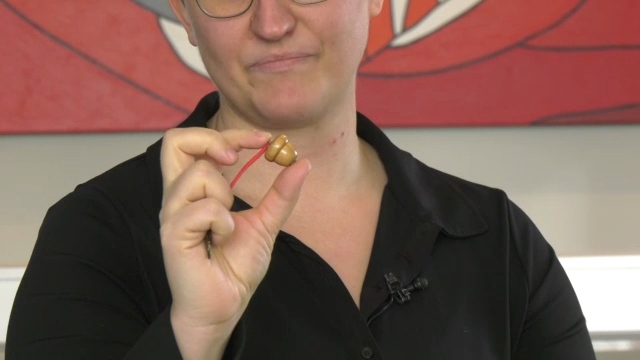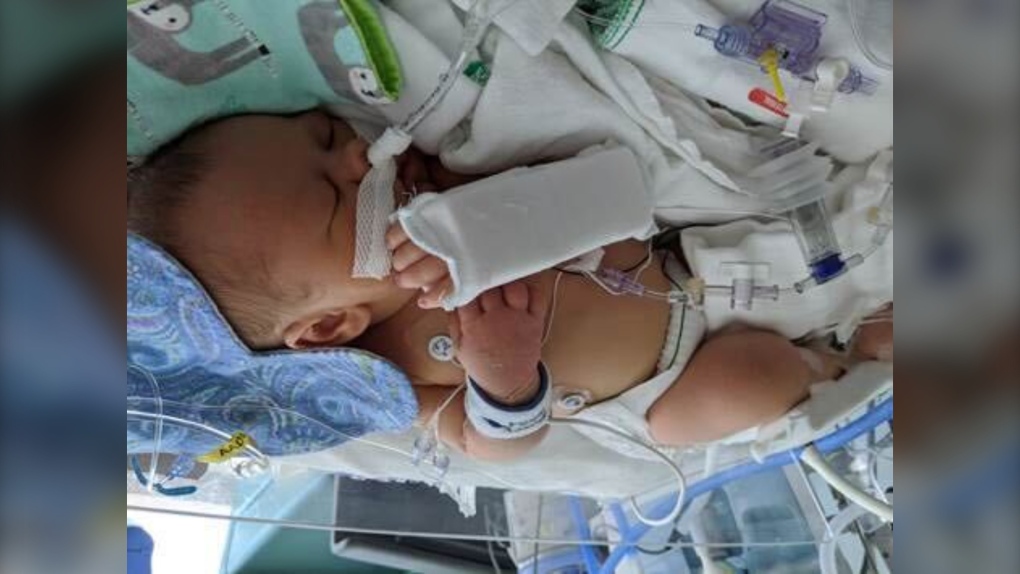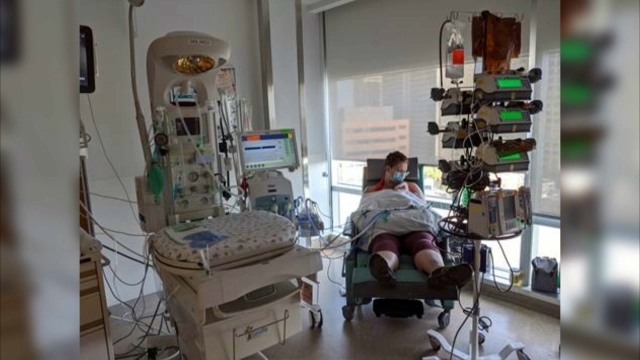'Even the playing field': New non-profit hopes to raise profile of congenital heart defects
An Alberta couple wants to ensure parents-to-be get the full picture when getting a sonogram after their son was born with a severe heart defect.
Amy Porter and her wife Sam learned in 2020 they would be expecting a baby boy. At 20 weeks, Amy's anatomy scan showed that her son, Artie, was looking healthy.
That scan missed a serious heart condition called transposition of the great arteries, where the position of the two main arteries carrying blood from the heart is switched, preventing proper flow.
Eight weeks later, Amy underwent an ultrasound as a precaution since doctors were concerned she measured large. That scan made a life-saving discovery.
"We found out that he had a very critical heart defect," Amy told CTV News Edmonton.
"I could tell that we were looking at his heart, but I didn't know why. And they are not legally allowed to tell you anything about your scans," she added. "So I kind of just had that in the back of my head."
She later found out from her obstetrician that she was being referred to specialists who would help her deliver her son.
"The only other information she gave was don't Google it," Amy said with a laugh. "I am a research nerd, and I find research very comforting. I feel if I know everything about something, then I won't be surprised."
Amy found out that her son's form of congenital heart defect was repairable through open-heart surgery and that the procedure had a success rate of 96 per cent.
 Amy holds a small keychain that represents the size of a heart at 20 weeks (CTV News Edmonton/Alison MacKinnon).
Amy holds a small keychain that represents the size of a heart at 20 weeks (CTV News Edmonton/Alison MacKinnon).
That diagnosis meant delivery in their chosen hospital was no longer an option. Her labour would be induced at the Royal Alexandra Hospital, only for Artie to be then rushed by specialized ambulance to the Stollery Children's Hospital.
"I got to see him at the end of the delivery table," Amy recounted. "I gave him a little rub on the head and let him go."
Amy had to stay as she recovered from her delivery. Her wife Sam accompanied Artie and saw him undergo life-saving heart surgery.
"That's when his oxygen saturation dropped, and that's when they had to intervene with a balloon septostomy to open up a hole between his top two atria," Sam explained.
"I was able to tell Amy that things were getting better," she added.
Artie is now a healthy and active two-year-old who loves to play with his older sister Frankie. He will have precautionary cardiology appointments annually to check on his heart.
 Artie rests after his surgery in 2020 (Supplied).
Artie rests after his surgery in 2020 (Supplied).
'THEY NEED A DIAGNOSIS AS EARLY AS POSSIBLE'
With the help of a pair of cardiologists, Amy has now started a new non-profit foundation to help increase awareness and the diagnosis rate of congenital heart defects.
"We're very grateful it was detected," Amy said. "But it was detected late. It should have been picked up at my 20-week anatomy scan."
 Artie was discharged after spending eight days in the hospital (Supplied).
Artie was discharged after spending eight days in the hospital (Supplied).
For Dr. Lisa Hornberger, that story is all too familiar. She works with Amy at the Tiny HeartsCan Foundation to support research and awareness of congenital heart defects.
"The biggest thing especially is having a diagnosis that's early enough in your pregnancy to know what's going on with your baby and get other tests to know what else is going on," Hornberger said.
"But also where there is a severe heart problem, [you have] to be delivered at the right place," she added.
According to the foundation, one in 100 kids will have a heart defect, which is also the most common congenital disease and the world's leading cause of infant mortality due to defect.
In Alberta, that means approximately 550 infants a year are born with a congenital heart defect, with research from the foundation suggesting half may not be detected before birth.
"They need a diagnosis as early as possible so that the doctors and the medical teams can be prepared to intervene right at that moment of birth," Amy said.
The foundation is also creating training for sonographers and hosting outreach sessions in rural parts of the province to educate health professionals on congenital heart defects. It hopes to become a national charity to further education programs beyond the province.
"These babies can be at risk of really severe outcomes in the first sort of minutes to days after birth," said Dr. Luke Eckersley, who also works with Tiny HeartsCan.
"Being on the right medications, having the right doctors, nurses, and right specialists around can make all the difference as far as their short- and long-term outcomes," he added.
"We just hope to even the playing field across the province, so everyone gets the best chance."
With files from CTV News Edmonton's Alison MacKinnon
CTVNews.ca Top Stories

B.C. tenants evicted for landlord's use after refusing large rent increase to take over neighbouring suite
Ashley Dickey and her mother rented part of the same Coquitlam duplex in three different decades under three different landlords.
Mountain guide dies after falling into a crevasse in Banff National Park
A man who fell into a crevasse while leading a backcountry ski group deep in the Canadian Rockies has died.
Expert warns of food consumption habits amid rising prices
A new survey by Dalhousie University's Agri-Food Analytics Lab asked Canadians about their food consumption habits amid rising prices.
MPP Sarah Jama asked to leave Ontario legislature for wearing keffiyeh
MPP Sarah Jama was asked to leave the Legislative Assembly of Ontario by House Speaker Ted Arnott on Thursday for wearing a keffiyeh, a garment which has been banned at Queen’s Park.
Charlie Woods, son of Tiger, shoots 81 in U.S. Open qualifier
Charlie Woods failed to advance in a U.S. Open local qualifying event Thursday, shooting a 9-over 81 at Legacy Golf & Tennis Club.
Ex-tabloid publisher testifies he scooped up possibly damaging tales to shield his old friend Trump
As Donald Trump was running for president in 2016, his old friend at the National Enquirer was scooping up potentially damaging stories about the candidate and paying out tens of thousands of dollars to keep them from the public eye.
Here's why provinces aren't following Saskatchewan's lead on the carbon tax home heating fight
After Prime Minister Justin Trudeau said the federal government would still send Canada Carbon Rebate cheques to Saskatchewan residents, despite Saskatchewan Premier Scott Moe's decision to stop collecting the carbon tax on natural gas or home heating, questions were raised about whether other provinces would follow suit. CTV News reached out across the country and here's what we found out.
Montreal actress calls Weinstein ruling 'discouraging' but not surprising
A Montreal actress, who has previously detailed incidents she had with disgraced Hollywood producer Harvey Weinstein, says a New York Court of Appeals decision overturning his 2020 rape conviction is 'discouraging' but not surprising.
Caleb Williams, Jayden Daniels and Drake Maye make it four NFL drafts with quarterbacks going 1-3
Caleb Williams is heading to the Windy City, aiming to become the franchise quarterback Chicago has sought for decades.

































